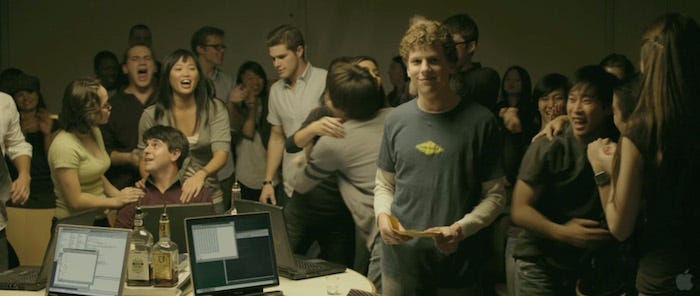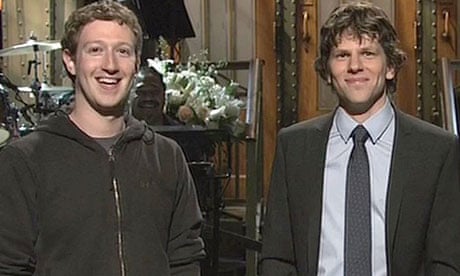|
 Released 2010 Directed by David Fincher Running time: 120 minutes Pity me, goon. Woe be upon me. Though my fate is self-inflicted, it is still too much for even your worst enemy. In an era where his name has been thoroughly dragged through the mud, where his current projects deservedly draw ire from every corner of the culture, and where his own arrogance has led to a number of downfalls we weren't sure one man could have, I am forced to defend Aaron Sorkin. I am not normally the kind of person who believes in smearing an artist for working on properties I don't personally like, but Sorkin is a special case - the argument has been made, many times over, that possibly no writer has done as much damage to humankind as Aaron Sorkin, and these people may actually have a point. Sorkin's seminal television show "The West Wing" was frequently cited as a major inspiration for the way several key figures within president Barack Obama's administration would conduct politics and manage their decision-making. Obama's campaign rather infamously started on a wave of promises and populist rhetoric that centered downtrodden Americans, a hopeless economy, and pointless wars that couldn't even manage to accomplish their own imperialist goals. After eight years underneath the rule of President George W Bush, who only arguably managed to win his first term through a Supreme Court decision that may have contradicted the actual will of the people, who started two wars and instated the Patriot Act in one of the biggest losses of civil rights Americans had ever seen, and tanked the economy into its worst recession since The Great Depression, voters were enthusiastic and downright hopeful about a President who was eloquent and composed as opposed to the previous Texan party boy past his prime. Eight years later, the Obama administration had solved the recession by kicking the can down the road and forgiving the rich of all their self-inflicted consequences, kept one war going while invading another, committed just as many war crimes as any other President, and deported more Mexican immigrants than any president before him. The film we focus on today was only two years into Obama's tenure, and as such, many of these disappointments were not yet visible - but the fact remained that the idealism of Sorkin's ideology was riding high at this point in time. His lofty ambitions that what the American people valued most was someone who could make a cinematic speech while justifying "tough" choices, who could deliver big words with a smile, seemed to have been proven right at the time. This was the Age of Aaron, where the demons he directed his ire at in The West Wing were banished forever (again, yes, only allegedly) and he could focus on other villains for the time being. It is maybe a terrible omen that even twelve years ago now, this was obviously Mark Zuckerberg.  I am not suggesting we absolve Aaron Sorkin of his crimes against good taste, but I am saying that The Social Network is a film that illustrates we at least share a common enemy with Sorkin, and we should use the film against him in the same way we can wield a discarded-but-functional weapon on the battlefield. Many critics claim that Sorkin wrote the film because he "envies" Zuckerberg - I find this hard to believe. Zuckerberg is clearly the villain from the first conversation of the film, where he demonstrates to his girlfriend that he values her mostly for the access she offers him more than as a human being - and acting as a portent for the future waves of internet misogynists we'd seen be witnessing. Sorkin is smart enough to recognize this is mostly because the crimes of the patriarchy have been consistent for centuries, and the internet only allowed it to take new shape. Facebook was, indeed, born out of a website that competed unwilling women against each other based on their sexual appeal - this is real, you can easily find the posts online. There is no exaggeration needed to depict young Zuckerberg as the lecherous creep he was or how odious his goals were. Zuckerberg's motivations throughout the film don't evolve much, because the world never gives him a situation where he needs to. He is repeatedly thrown like a limp ragdoll into the awaiting lap of success. Repeatedly throughout the film we are given its main thrust - access is circles within circles. Every character in this movie likely makes more income than anyone who ever reads this ever will in their entire lives, despite usually not even hitting middle age, and yet all of them are mostly concerned with how bad it looks that they haven't made it into an even more exclusive club. This is the inevitable result of a social structure that demands competition over cooperation - where everyone is accomplishing more and more yet never satisfied. When the Winklevoss twins take their concerns with Zuckerberg's conduct to the president of Harvard, his only response is to nut up or shut up, and make something better. Today the Winklevoss twins run a cryptocurrency exchange.  There is a relentless sense of cold to the film. You can see it in the CGI-fogged breath of the characters every time they're outside, in the barren trees on Harvard's campus, how every scene set in the daytime is still some kind of sickly overcast. Zuckerberg, at one point, shows up to a business meeting in a cozy, insulating bathrobe and fuzzy slippers. It's not just the dialogue that's icy. Fincher manages to accomplish the impossible in cinema with this film, even if he does it by cheating. Movies about computer nerds are always the Goddamn worst. It's a profession that's unfathomable to dramatize, that a bunch of dorks at keyboards giving themselves scoliosis could ever be appealing. Fincher solves this problem by filming literally anybody else. As Zuckerberg compiles the first prototypes of Facemash, our view frequently cuts to a bus of completely unrelated partygoers as they arrive at a new shindig, probably not their first of the night, and - most importantly - a party that Zuckerberg could be at, but isn't. He doesn't have the access. And even as he gains it later in the film, it's his last interest. Despite what he tells Erica at the beginning of the movie, he does not want to get into parties because they're "cool and fun." He wants to get in them because he just wants to prove he can. It's probably time to talk about the score. This was the first outing of Trent Reznor and Atticus Ross in the film industry, of whom Reznor previously reigned as the king of 90s industrial as Nine Inch Nails (and whom Ross would become a permanent member of some years later.) Reznor had already demonstrated instrumental prowess in his experimental album Ghosts I-IV, of which two tracks are refactored into songs for the soundtrack here - a special version of the soundtrack omitting these tracks had to be made just for the Academy of Motion Pictures Arts and Sciences to follow its rules for the Best Original Score Oscar, which it eventually won. Hand Covers Bruise is, these days, iconic - and it deserves it. As an uneasy string sample quivers, Zuckerberg walks alone across the Harvard campus in the middle of the night, shivering to the off-rhythm of its own shakiness. Reznor, at this point in his career, was a firebrand. After completing his contract with Interscope, he had publicly sworn off record labels entirely. Attempts to sell NIN's music personally through the group's own website were rousing successes, with the aforementioned Ghosts I-IV making so much money being sold direct through nin.com that it funded the entire next Nine Inch Nails album which he gave away for free. He encouraged fans in Brazil who were dealing with ridiculous local prices on his music to "steal, steal, and steal some more," and would even go so far as to leak a live concert DVD stuck in legal hell on the internet himself - at least, it's rumored. Unfortunately, just as a byproduct of The Social Network being a Columbia film, if Reznor wanted to work with a director like Fincher he had to put the album out through Columbia Records. In 2013 the next Nine Inch Nails album was released through Columbia Records, where he proudly proclaimed in an interview that "I don't like the idea of Ziggy Stardust begging for scraps - my record is ten bucks or go gently caress yourself." He went on to serve on the executive board of Beats Music, which became Apple Music after the company's acquisition in 2015.  Sorkin has stated repeatedly that he would love to make a sequel, assuming Fincher would return for director duties. I'm not convinced it needs one. The Social Network already ends on the ominous note that Facebook will go on to ruin the world to serve one man's pettiness. Much of the film's marketing revolved around the claim that Mark Zuckerberg had "500 million friends" - the amount of Facebook accounts at the time. This number is quaint in an era where Facebook has hit 2.8 billion accounts. Facebook has repeatedly been proven not to be interested in political neutrality, despite its claims - alarm bells about its disproportionate amount of right-wing advertising have been ringing since at least 2013. In 2018, Facebook was found to have played a key role in the genocide of Muslim citizens in Myanmar. Much of the investigations around Russian disinformation campaigns focus around Facebook - and that's simply because you can buy any kind of ad you want on Facebook, and receive little to no oversight for it. Previously, if foreign countries wanted to influence another's election, they'd send spies and propagandists and other elements of espionage into the country itself. Now you pay a few hundred bucks and upload a jpeg. These days, Facebook - which has since renamed itself to Meta and redefined Facebook as only one service they offer amongst a catalogue of others they've acquired - is significantly less in demand. Zuckerberg's interests seem mostly focused on his acquired company Oculus, where he hopes to establish the "Metaverse," a campaign so ill-defined it is hard to describe the goal let alone imagine it. Zuckerberg himself can't seem to tell you what it is, and its functionality is already accomplished by programs like VRChat and, yes, Second Life. The initiative is not going well. Social media sites, when first introduced, were astounding new methods of communication through which people could keep in touch and connect in ways that were previously impossible. To this day, a significant amount of the population relies on them for the majority of their social interactions. But as time went on, they needed to become monetized, which meant turning them into advertising platforms - and now even that business has shriveled up as the amount of data Facebook can provide advertisers about its own users has reached peak saturation. Meta's shares recently cratered 73% year over year, due to a lack of progress in Facebook as a service, dwindling amounts of disappointed Instagram users, and the Metaverse being a complete non-starter. If you were optimistic, you could read this as Zuckerberg finally having his Ozymandias moment - but I'm not so sure. If there's anything that defines today's era of capital, it's a service that nobody enjoys and improves nothing nonetheless becoming the peak standard for everybody. They even have a name for this, "disrupting the market," and it's the main way companies make money now - burn hundreds of millions of dollars to undercut everyone currently in the field, become an oligopoly, and then raise prices because consumers have no real choice other than you. Uber's competition isn't Lyft, it's the taxi cabs that already patrol major cities. Netflix's competition wasn't Hulu, it was your cable company, and every "cord-cutter" played right into their hands. And it's hard to imagine a company more disruptive than Facebook, whose competition was never MySpace, but our already-established ways of connecting with people, which weren't good enough for Mark Zuckerberg.  The Social Network, at the time of writing, is currently available on Blu-Ray or through the digital film distribution platform of your choice. Movie of the Month list Previous Movie of the Month Pirate Jet fucked around with this message at 06:52 on Nov 5, 2022 |
|
|
|

|
| # ? Apr 29, 2024 00:50 |
|
So how bout the movie is it good or what?
|
|
|
|
banned from Starbucks posted:So how bout the movie is it good or what? It is
|
|
|
|
Easily one of the best movies of the 2010s. Sorkinís best script ever, some of Fincherís best work, Reznor/Ross nail film scoring on the first try, perfect editing, amazing cast, etc
|
|
|
|
An incredibly apt choice for this month.
|
|
|
|
Whoa. Haven't seen it in... gently caress, twelve years, but movie good. I had no idea who Sorkin was a that time lol.
|
|
|
|
Goddamn do I love this movie and I revisit it a lot. I remember at the time that a Facebook movie written by Sorkin, directed by Fincher and scored by Reznor/Ross felt like such a bizarre combination that should not have worked but it extremely loving does. The scene at the end featuring Eduardo's meltdown at Facebook HQ remains one of my favourite scenes in a movie. Andrew Garfield's acting - a mixture of fury at the professional betrayal and heartbreak at the personal betrayal, plus somehow managing to nail all of Sorkin's snappy little quips at the same time - is phenomenal and the direction of the scene sublime. The CGI of the Winklevoss twins (shame about who plays them) also remains seamless to this day.
|
|
|
|
Haven't seen this movie in a long time but I remember liking it quite a bit when I first saw it. I've also joked on this forum a few times about what a sequel would look like and boy would it be rough. For as unflattering as this movie makes Zuck out to be, it doesn't hold a candle to the last decade or so.
|
|
|
|
Watched this today and was surprised I liked it so much. What a loser
|
|
|
|
Oh I watched it like two weeks ago and forgot to post. From seeing the movie when it released, I remembered its depiction of Zuckerberg as being a bit of an unpleasant guy, so I was a little surprised when I watched the movie again and he was just a complete prick from the word go. The whole access thing is essential. What Facebook is, is an attempt to take all these invisible networks and turn them into something quantifiable. Not just formal Harvard clubs, but every association between any two people. And the project has been so successful that now people see the online map-of-associations as being as important as the real-world associations themselves. The Musk movie - c'mon, that's what we're dancing around here, right? - would be about the man's obsession with exactly the same sort of phony, quantifiable connections that Facebook paved the way for. Musk - and right-wingers in general - is obsessed with the idea that Twitter engaged in shadow-banning, follower-throttling, that there was some conspiracy to ensure that his posts did not get the engagement or positive feedback they obviously deserved. Not rejection from a club, not being poor, not having his rights infringed; insufficient upvotes. A couple years ago Charlie Brooker (the Black Mirror/Yearly Wipe guy) made some sort of TV show going over the top 20 most influential video games of all time or something like that. It wasn't exactly art, but it was more intellectual than you would assume from that premise. Anyway, the #1 was Twitter. Brooker's argument was that it gamified the act of discussion itself, creating a framework where people would craft opinions to like joust with each other, which slowly filtered out to every other website. Facebook is an earlier, less-efficient step in the process: gamifying social connection, trying to turn it into something where you can keep score, rather than a thing you do because it feels good. I mean Christ, he screws over Eduardo the same day as Number goes past a million.
|
|
|
|
MacheteZombie posted:Watched this today and was surprised I liked it so much. What a loser Yep, people hate Sorkin for very correct reasons but I don't understand the idea people have that his hatred of Zuckerberg must be insincere. Kazzah posted:Oh I watched it like two weeks ago and forgot to post. From seeing the movie when it released, I remembered its depiction of Zuckerberg as being a bit of an unpleasant guy, so I was a little surprised when I watched the movie again and he was just a complete prick from the word go. Very correct post, don't know what to say here that wouldn't be restating anything - everyone in the film is obsessed with access and exclusivity and Zuckerberg created Facebook to gamify it in a way his nerd brain would understand.
|
|
|
|

|
| # ? Apr 29, 2024 00:50 |
|
Kazzah posted:Oh I watched it like two weeks ago and forgot to post. From seeing the movie when it released, I remembered its depiction of Zuckerberg as being a bit of an unpleasant guy, so I was a little surprised when I watched the movie again and he was just a complete prick from the word go. This post is very good, thank you for writing it
|
|
|
















